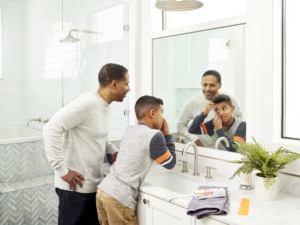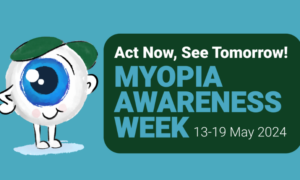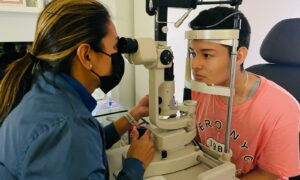 January 18, 2021
January 18, 2021
SAN RAMON, Calif. — There is a gap between the concern of eye care professionals (ECPs) and the understanding of parents regarding the growing myopia epidemic and its impact on future eye health, according to a recently released global survey from CooperVision.
The results of the Global Myopia Attitudes and Awareness Study,‡ illustrated in the newly released infographic here, underscore the need for education and evidence-based approaches:
Four in five eye care professionals (82 percent) worry that their young patients will have significant eye health issues associated with myopia as they grow older,1 but over half (54 percent) say parents don’t understand these future eye health risks.2
Globally, parents are more familiar with the term “nearsightedness” (short-sightedness) than myopia, though the difference varies from country to country. Whereas at least eight in 10 parents expressed familiarity with the term “nearsightedness” across all surveyed countries (82-98 percent), only Spain (91 percent), Hong Kong (86 percent), and Australia and New Zealand (90 percent) could say the same for myopia.
Once an explanation brought myopia into focus for the surveyed parents, 87 percent were open to learning more about myopia management solutions.3 They also prioritized ease of use and comfort for their child. After learning specifically about MiSight 1 day – an FDA-approved* daily soft contact lens designed to slow the progression of myopia in children, aged 8-12 at the initiation of treatment4† – the majority (76 percent) also believe it is safe and easy to use for children as young as 8 years old.3
Nearly three-quarters of ECPs agree that a comprehensive myopia management program featuring MiSight 1 day seems easy (72 percent) for children and their parents to follow and is an even more convenient (75 percent) way to manage myopia than other products.1 Ultimately, what many ECPs (92 percent) find important about offering myopia management is the ability to make a difference in their young patients’ future eye health.1
Despite a high motivation to make a difference, only 58 percent of ECPs cite clinical results as a top criterion for selecting a myopia management approach.1
“In these results, we see both opportunity and encouragement for myopia management globally,” said Jennifer Lambert, CooperVision senior director of global myopia management. “A top priority for us and many of our partners is to strengthen myopia awareness among parents worldwide. To this end, we launched an unparalleled consumer campaign in the U.S. late last year and have expanded our Brilliant Futures Myopia Management Program into seven other countries in recent months. The indication that parents are open to learning about solutions4 once they understand the condition is welcome encouragement that these efforts will prove effective and worthwhile.”
“Among ECPs, we see a need for a stronger emphasis on science and clinical evidence in myopia management decisions. This is an important step toward our vision for myopia management as a standard of care, and it will take teamwork and commitment from industry, eye care professionals, pediatricians, and others to succeed. Thankfully, more research on the topic is regularly emerging, including ongoing findings from our landmark MiSight 1 day study.” §
Other highlights from the study include:
- ECPs identified that the most important reasons for recommending specific myopia management options include having the best clinical results (58 percent), being the easiest for children to use (44 percent), and being an approved product (44 percent) (i.e., regulatory indication to slow myopia progression).1
- 84 percent of ECPs would consider putting their pediatric myopes into contact lenses that could help slow the progression of myopia.1 Half of ECPs are comfortable fitting myopic children with contact lenses from age 8. This increases to three in four ECPs by age 10. The average age ECPs are comfortable with fitting children with contact lenses is 9.1 years old.2
- Parents prefer their children to be older when starting to use contact lenses. According to parent data, one in two parents are comfortable with their children wearing contact lenses from age 11. This increases to three in four by age 14. The average age parents are comfortable with fitting children with contact lenses is 11.7 years old.2
- However, the introduction of MiSight 1 day nearly triples parents’ interest in a myopia management program with soft contact lenses, rising from 27 percent to 74 percent.3
* U.S. Indications for Use: MiSight® 1 Day (omafilcon A) Soft (Hydrophilic) Contact Lenses for daily wear are indicated for the correction of myopic ametropia and for slowing the progression of myopia in children with non-diseased eyes, who at the initiation of treatment are 8-12 years of age and have a refraction of -0.75 to -4.00 diopters (spherical equivalent) with ≤ 0.75 diopters of astigmatism. The lens is to be discarded after each removal.
† Compared to a single vision 1 day lens over a 3-year period.
‡ Research Method: The survey was conducted online, and all respondents were paid an honorarium in appreciation of their time. ECPs were screened to be sure they have been in practice for at least a year, treat a minimum number of patients monthly, and fit 10 percent or more of those patients into contacts, of which at least 10 percent are pediatric patients, that they would be open to fitting some pediatric patients into a soft contact lens to stop the progression of their myopia, and that they have some responsibility in deciding which products to carry. Included in the Global Myopia Attitudes and Awareness Study were 402 ECPs and 1,009 parents with children ages 6 to 15 across Canada, Spain, the United Kingdom, Germany, Hong Kong, Australia, and New Zealand.
§ More information on the latest findings from the ongoing MiSight® 1 day study can be found here.
1 CVI data on file 2019. Global survey by Decision Analyst with 402 ECPs in UK, Canada, Germany, Spain, Hong Kong, Australia/NZ.
2 CVI data on file 2019. Global survey by Decision Analyst with 402 ECPs and 1,009 parents in UK, Canada, Germany, Spain, Hong Kong, Australia/NZ.
3 CVI data on file 2019. Global survey by Decision Analyst with 1,009 parents in UK, Canada, Germany, Spain, Hong Kong, Australia/NZ.
4 Chamberlain P, et al. A 3-year randomized clinical trial of MiSight® lenses for myopia control. Optom Vis Sci. 2019; 96(8):556-67.













